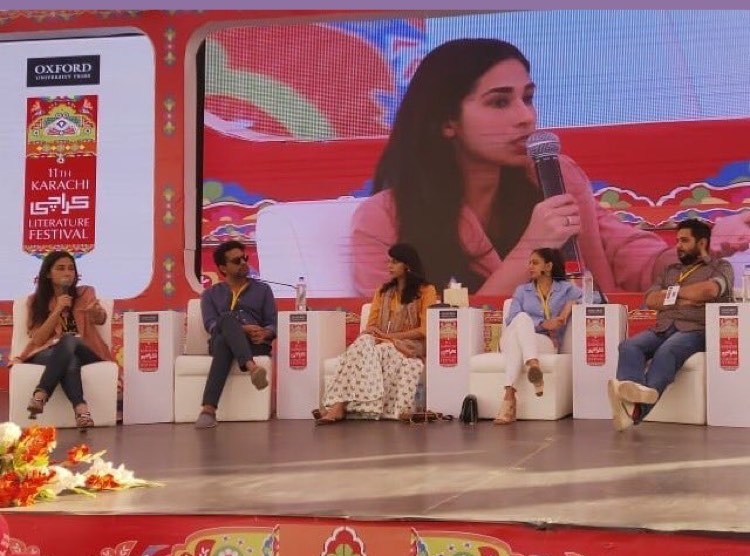The 11th Karachi Literature Festival wrapped up on Sunday evening with several though-provoking and fun-filled sessions. On Day 3, young comedians were invited in a session to discuss the state of satire in Pakistan and how the new generation is contributing to redefine it. The panel included Shehzad Ghias Shaikh, Ali Gul Pir, Natalia Gul and Gul Zaib Shakeel.
Moderated by Hamna Zubair, the first discourse was about ‘punching up’, a term which is usually misconstrued in comic circles. In today’s day and age, many a time people are called out for their offensive jokes and then comics throw their hands, wondering what are they allowed to joke about? Stand-up comedian Shehzad Ghias clarified that misconception.
“The rule, if there is any, to tackle sensitive topics is that always punch up. That means not to crack jokes on already marginalized communities or ones which are victims for instance: obese people, homosexuals, transgenders etc,” he said.
This lead to a conversation about how and when is it okay to make fun of an ethnicity or a culture. Natalia Gul, a theater actor and comedian, has suffered at the hands of a similar incident when she called Sindhis “hairy and horny” in one of her stage performances. This was followed by death and rape threats and what not, leaving her with no choice but to delete her social media accounts and leave the country.
“I am a Sindhi so I joked about my own community, however, nobody listened to the content. All the comments on my videos had no criticism on the content but people were disgusted by the presence of a girl on stage, making fun of anyone or anything,” she remarked.
Ali Gul Pir, famous for his songs Waderai Ka Beta and Taroo Maroo, has made fun of many Sindhi stereotypes earlier, but none was met with such harsh criticism.
“We’ve been stereotyping Sindhis for years by calling them corrupt and illiterate. We don’t look at the facts that how Sindh (especially interior/rural area) has been one of the most neglected province. We (Sindhis) are still rooted to our culture and therefore you can find Hindus or Sikhs at dargahs and mazaars. But none of this is being projected in the media; all we do is emphasize on the same criminal element. Having said that, I can’t imagine how drasticalaly different the response of joking about our community would have been for Natalia,” he said.

This raised the question how safer is it for women to pursue comedy as a career?
Gul Zaib Shakeel, who is head writer at Teeli — Pakistan’s leading digital entertainment channel — expressed that she has always been behind the camera, hence she has never been exposed to public reactions at a personal level. However she shared an anecdote.
“We recently released a series titled Superheroes which is about how regular people navigate in modern Pakistan. One person on YouTube commented the same text ‘femi shit [feminist shit]’ more than ten times. I am unable to understand why?” she asked rhetorically.
Shehzad Ghias added his two cents by sharing that he once made a female Tinder profile and ran a fake Twitter account of an American woman, Samantha Gerry. During his brief stint, he realized that “In Pakistan, sexual assault is used only to keep women in check.”
“I feel creating a safe community is necessary to ensure that more women comics enter this industry,” Shehzad said adding, “When I voiced my opinion about a certain individual after he was exposed as a harasser, very few people supported me. This isn’t a good precedence.”
The session ended with a Q&A session where despite much deliberation, no concrete lines were drawn as to what is appropriate humour and what’s not. Perhaps comedy, like any other art form, cannot be bounded by rules as there will always be a joke that will gain incredible success despite offending someone’s sensibility. The responsibility lies on the person who is cracking it and the context.





